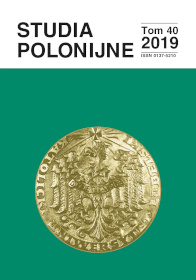Emigracyjna polityka ograniczania skutków komunistycznej propagandy. Wybrane zagadnienia
Emigration Policy Limiting the Effects of Communist Propaganda. Select Issues
Author(s): Robert ZapartSubject(s): Social Sciences, Sociology, Migration Studies
Published by: Towarzystwo Naukowe KUL & Katolicki Uniwersytet Lubelski Jana Pawła II
Keywords: political ideas; media policy; communist propaganda; indoctrination; anti-communism; Polish emigration; government in exile; social communication
Summary/Abstract: The new political order imposed and forced on Poland by foreign powers was accompanied by the communist authorities ‘softening’ society with logical arguments. This was done in order to demonstrate the legitimacy of the implemented solutions for rebuilding the pre-war concepts related to the raison d’etat. Thus, the primacy of specific state interests was placed over other public and private values, including sovereignty, independence and their position in international relations. The messages consistently implemented by them were adapted to all ages and intellectual levels. These were to shape a new man, a tangible personification of the system’s future victories. They Cut off individuals from objective sources of information, and thus the basic intellectual values of existence in the public space, while subjecting people to the constant pressure of doctrinal novelties, including even the most nonsense claims.In the long run, the result was to make people lose their sense of truth and adopt to monopolistic, manipulated ideological messages about reality. The Polish authorities in exile and the elite of emigrant journalism tried to methodologically counteract this social engineering, whose efforts in this regard are approximated in the article. The subject of comparative scientific analysis were the mechanisms and instruments of communist propaganda that had an impact on Polish society. This includes methods adopted by the political elites of the emigrant milieu to counteract these unfavorable phenomena. Part of it was also a confrontation of two opposing publications by the national politician Adam Rapacki and an émigré journalist Józef Kisielewski.In the summary, the author pointed out that the main problem that the forced emigration could not cope with was the progressive and unconquerable ideological isolation of Central and Eastern Europe at that time from Western democracy ruling according to the principles of democracy. Consequently, there was a serious limit to the possibility of influencing the indoctrination message coming from the political opponent based on Soviet experience. In his opinion, the analysis of propaganda mechanisms of social incapacitation used in the last century and selected measures to counteract the threat that limits the sovereign’s subjectivity will help eliminate or limit future aspirations of potential followers of the former elite in leadership.
Journal: Studia Polonijne
- Issue Year: 2019
- Issue No: 40
- Page Range: 273-299
- Page Count: 27
- Language: Polish

